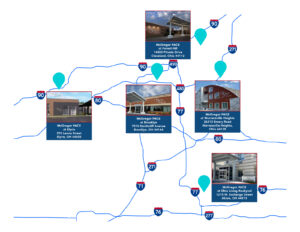
Visiting Elderly Family Members During COVID
Tips for Ensuring a Safe Visit for All Involved
We have all been navigating the COVID pandemic for nearly two years. During this time, the rules and regulations for visiting family members in senior care facilities have changed multiple times. As we awaited the availability of vaccines for our seniors and their caregivers, visits were limited to saying hello through a window of glass or hopping on a Zoom or FaceTime call.
Fortunately last spring, restrictions were lifted and in-person visits resumed. But with the rise of the Delta and Omicron COVID variants and breakthrough infections, many families are left confused and asking themselves whether it is still safe to visit their elderly loved ones in person.
Every family will need to make decisions based on their own unique situations. If a senior is living in an assisted living facility or senior care community, family members will of course need to follow all policies defined by that facility. If a senior is living at home, you will need to make an informed decision on whether to visit based on a number of factors. A good place to start is by asking the following questions.
What is your vaccination status?
McGregor highly encourages the COVID-19 vaccination as the best form of prevention for COVID-19 and to lessen the severity of symptoms associated with a breakthrough infection. If you have not been fully vaccinated, the CDC advises general prevention strategies, such as mask wearing, social distancing, and proper ventilation.
Is anyone experiencing any COVID-19 symptoms?
Generally, if someone is experiencing any of the symptoms of COVID-19, they should get tested as soon as possible and isolate, per the Centers for Disease Control and Prevention (CDC) quarantine guidelines. These guidelines are changing frequently, so be sure to check them regularly.
The CDC defines the symptoms of COVID as the following:
- Fever or chills
- Cough
- Shortness of breath or difficulty breathing
- Fatigue
- Muscle or body aches
- Headache
- New loss of taste or smell
- Sore throat
- Congestion or runny nose
- Nausea or vomiting
- Diarrhea
Does your family member have a condition that has a high comorbidity with the virus?
If your elderly loved one has cancer or heart disease, or takes medication that suppresses their immune systems, they are potentially at a greater risk of contracting COVID-19. Before you plan an in-person visit, be sure to communicate with your loved one’s health care provider about any necessary precautions or guidance.
Where is the visit taking place?
The CDC states that outdoor activities and settings are generally safer than indoor settings. Be sure to avoid any indoor locations that are poorly ventilated or crowded.
McGregor Is Here to Help
COVID-19 Resources for Seniors and Their Families
As you navigate making decisions about in-person visits with your elderly loved one, we strongly advise you to take advantage of the many resources that exist. We have included some below for your reference:
- CDC COVID-19 Recommendations for Older Adults
- CDC COVID-19 Risks and Vaccine Information for Older Adults
- CDC Families and COVID-19
Please also feel free to reach out to our team for guidance or with questions regarding our visitation policy during COVID.


